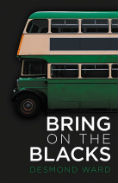
 |
Set in the early 1960s as the Civil Rights movement’s early steps are taken in the United Kingdom, this story blends fact and fiction to present a pivotal moment in the battle for equal rights. Dabber is a young conductor in the bus industry in Bristol who faces tough working conditions due to insufficient workers. Without enough people to run the buses, routes have to be canceled, and buses are abandoned in alleys, stranding people around the city. Dabber believes that if the Bristol Omnibus Company would just lift their ban on hiring black, Asian, and West Indian people, they would have more than enough people to keep all the buses running. But attitudes are slow to change within his company, despite the mounting pressure coming from the university campus.
Another struggle for rights is also gaining traction as women are continuing to push for further equality in British society. Dabber’s girlfriend Melody is becoming increasingly aloof, putting a strain on their relationship of pub crawling and pinball until she just eventually disappears. After a few weeks, Melody returns more devoted to Dabber but still plagued by a malaise that she refuses to talk about. When Melody’s secret comes to the forefront, it illustrates her inspiration to fight for women’s rights at the same time as Dabber pushes for his employer to not discriminate based on race. With new societal ideas coming to the forefront and traditional ways of thinking serving as the resistance, Bristol and its citizens have to face its past as a facilitator of inequality if it wants to move forward to a more enlightened state.
The way that this book blends a fictional narrative and actual historical events gives it a deeper, more powerful human connection than just an invented story could accomplish. What adds extra punch to that humanity is that the author actually worked for the Bristol Omnibus Company during these events and times. By combining his imagination with actual first-hand experience, it’s not hard to imagine the events of this book playing out in the real world. The familiarity with the city and the people who lived there in the 1960s comes right off the page, inviting the reader in whether they know Bristol or not. The characters create a magnetic and entertaining experience for the audience while the subject matter that serves as the conflict in this story is personal to many and certainly something that bears consideration in today’s climate.
For those that weren’t around in the Civil Rights era or weren’t aware of its impact specifically in the United Kingdom, this story’s history is fascinating. Dabber’s moral compass illustrates the need for people to not only believe in doing the right thing but to stand up and do it, even if it creates conflict or tension. As far as protagonists go, Dabber is interesting and compelling. He certainly serves as a force for justice, but he’s also far from perfect at times, and that makes his good qualities shine all the brighter. His outlook toward tolerance and how to treat other people becomes the message of this story in many ways: that respecting others is how to create change that benefits all. Historical fiction is at its best when it blurs the line between real and imaginary, and a story composed this well, coming from someone who was as much there as anyone else, makes it worth reading.